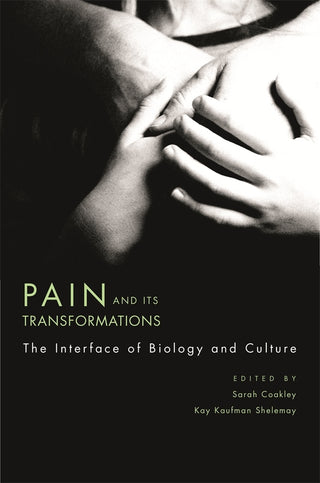Pain and Its Transformations : The Interface of Biology and Culture
- Unit price
- / per
-
Author:Sarah Coakley
-
ISBN:9780674024564
-
Publication Date:January 2008
-
Edition:1
-
Pages:358
-
Binding:Hardback
-
Publisher:Harvard University Press
-
Country of Publication:USA


A Back Order button means that we don’t have the book in stock at our store. It may already be on order – or we can order it for you from a publisher or distributor at no additional cost.
As we source items from around the globe, a back-order can take anywhere from 5 days to several weeks to arrive, depending on the title.
To check how long this might take, you’re welcome to contact us and we can provide an ETA or any other information you need. We recommend checking the timeframe before committing to an online order.
Pain and Its Transformations : The Interface of Biology and Culture
- Unit price
- / per
-
Author:Sarah Coakley
-
ISBN:9780674024564
-
Publication Date:January 2008
-
Edition:1
-
Pages:358
-
Binding:Hardback
-
Publisher:Harvard University Press
-
Country of Publication:USA
Description
Pain is immediate and searing but remains a deep mystery for sufferers, their physicians, and researchers. As neuroscientific research shows, even the immediate sensation of pain is shaped by psychological state and interpretation. At the same time, many individuals and cultures find meaning, particularly religious meaning, even in chronic and inexplicable pain.
This ambitious interdisciplinary book includes not only essays but also discussions among a wide range of specialists. Neuroscientists, psychiatrists, anthropologists, musicologists, and scholars of religion examine the ways that meditation, music, prayer, and ritual can mediate pain, offer a narrative that transcends the sufferer, and give public dignity to private agony. They discuss topics as disparate as the molecular basis of pain, the controversial status of gate control theory, the possible links between the relaxation response and meditative practices in Christianity and Buddhism, and the mediation of pain and intense emotion in music, dance, and ritual. The authors conclude by pondering the place of pain in understanding - or the human failure to understand - good and evil in history.
Adding product to your cart
You may also like
A Back Order button means that we don’t have the book in stock at our store. It may already be on order – or we can order it for you from a publisher or distributor at no additional cost.
As we source items from around the globe, a back-order can take anywhere from 5 days to several weeks to arrive, depending on the title.
To check how long this might take, you’re welcome to contact us and we can provide an ETA or any other information you need. We recommend checking the timeframe before committing to an online order.
You may also like
You may also like
-
Pain is immediate and searing but remains a deep mystery for sufferers, their physicians, and researchers. As neuroscientific research shows, even the immediate sensation of pain is shaped by psychological state and interpretation. At the same time, many individuals and cultures find meaning, particularly religious meaning, even in chronic and inexplicable pain.
This ambitious interdisciplinary book includes not only essays but also discussions among a wide range of specialists. Neuroscientists, psychiatrists, anthropologists, musicologists, and scholars of religion examine the ways that meditation, music, prayer, and ritual can mediate pain, offer a narrative that transcends the sufferer, and give public dignity to private agony. They discuss topics as disparate as the molecular basis of pain, the controversial status of gate control theory, the possible links between the relaxation response and meditative practices in Christianity and Buddhism, and the mediation of pain and intense emotion in music, dance, and ritual. The authors conclude by pondering the place of pain in understanding - or the human failure to understand - good and evil in history.
-
-
Author: Sarah CoakleyISBN: 9780674024564Publication Date: January 2008Edition: 1Pages: 358Binding: HardbackPublisher: Harvard University PressCountry of Publication: USA
Pain is immediate and searing but remains a deep mystery for sufferers, their physicians, and researchers. As neuroscientific research shows, even the immediate sensation of pain is shaped by psychological state and interpretation. At the same time, many individuals and cultures find meaning, particularly religious meaning, even in chronic and inexplicable pain.
This ambitious interdisciplinary book includes not only essays but also discussions among a wide range of specialists. Neuroscientists, psychiatrists, anthropologists, musicologists, and scholars of religion examine the ways that meditation, music, prayer, and ritual can mediate pain, offer a narrative that transcends the sufferer, and give public dignity to private agony. They discuss topics as disparate as the molecular basis of pain, the controversial status of gate control theory, the possible links between the relaxation response and meditative practices in Christianity and Buddhism, and the mediation of pain and intense emotion in music, dance, and ritual. The authors conclude by pondering the place of pain in understanding - or the human failure to understand - good and evil in history.
-
Author: Sarah CoakleyISBN: 9780674024564Publication Date: January 2008Edition: 1Pages: 358Binding: HardbackPublisher: Harvard University PressCountry of Publication: USA
-



